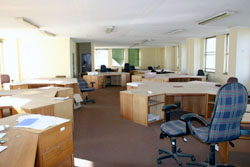1 February 2005
MediaNews 16 - February 2005
Zimbabwe's hampered flow of information in run-up to elections
Background
By *
A few weeks before the Zimbabwean parliamentary elections slated for a still to be announced date in March, things are as 'normal' as they can be in the country. There is no question that things will change when the opposition Movement for Democratic Change (MDC) announces whether it is going to participate in the elections. But whether Zimbabwe’s biggest opposition party takes part or not, the question whether voters are fully empowered to make an informed choice will play a very significant role in the result of the election. One of the main demands of MDC is for the free flow of information, which at the moment is limited by various pieces of legislation put in place by the government.
 | | The Daily News is closed down |
While the government can argue that there is media freedom in Zimbabwe because independent newspapers such as the Independent, The Financial Gazette, The Standard and the Mirror are allowed to publish it has not hesitated to use the Access to Information and Privacy Act (AIPPA) to ban the Daily News, The Daily News on Sunday and The Tribune for their critical stance.
No go area
The papers that are still publishing do a sterling job at trying to tell the story the way it is but what happened to the banned papers is always a reminder of what can happen if one oversteps the mark. And, just like Zanu-PF has declared certain parts of the country such as Mashonaland East ‘no go areas’ for the opposition, one risks severe abuse if seen with a copy of any of the independent papers in the ruling party’s strongholds.
This means that beside radio for most and television for some, the only source of information is the political parties themselves and while the ruling party has the right to demonize the MDC as much as it wants, the opposition party cannot campaign or carry out normal political activities in the areas where it is ‘banned’. The state broadcaster recently refused to carry MDC advertisements even though the government is claiming ‘electoral changes'.
In Zimbabwe’s state-controlled media, the opposition exists only when it is being talked about negatively and it never has the right to respond. State employed journalists are nothing more than megaphones of the ruling party.
Alternative sources
But just like during the days of White rule in the then Rhodesia when the State had a monopoly on broadcasting, those with shortwave receivers tune in to external radio stations such as the British Broadcasting Corporation. The Zimbabwe specific stations such as SW Africa and the Voice of America’s Studio 7 are also alternative sources of information.
The latter is even more potent as it is available on AM. A regular listener, who shall remain anonymous as he works for the government, told this reporter of what he described as a "fascinating" interview Studio 7 carried out with a Zanu-PF and MDC parliamentarian. "I wish they could allow this kind of thing to happen here," he said.
Political party campaigns are also another form of information dissemination but after the 2000 parliamentary elections the MDC’s Secretary General Welshman Ncube, said they stopped campaigning in some parts of the country because after holding rallies in those areas, people who had attended were assaulted and in some cases killed.
Prejudicial
The Criminal Law (Codification and Reform) Bill, which if and when it is signed into law by the government, will further make life difficult for journalists as it will impose a heavy fine, a jail term of up to 20 years or both for anyone publishing "false" information deemed "prejudicial against the state".
David Masunda assistant editor of The Standard weekly newspaper, "It will make journalists scared; you cannot speculate or infer and while before it could be a civil matter, now you can be jailed," he said.
Access to information by the Zimbabwean electorate is therefore going to be very difficult unless the government removes all the hurdles that exist at the moment but the people try by all means at their disposal to get information. But, as one man patiently waiting in his car in a fuel queue recently observed, "We will not forget the hardships we have endured during the past few years come voting day."
The government may deny Zimbabweans access to information but its failures are there for all to see and feel. There is no information more potent than that. Written by a Zimbabwean free-lance journalist who cannot be named because of Zimbabwe's media laws
|

